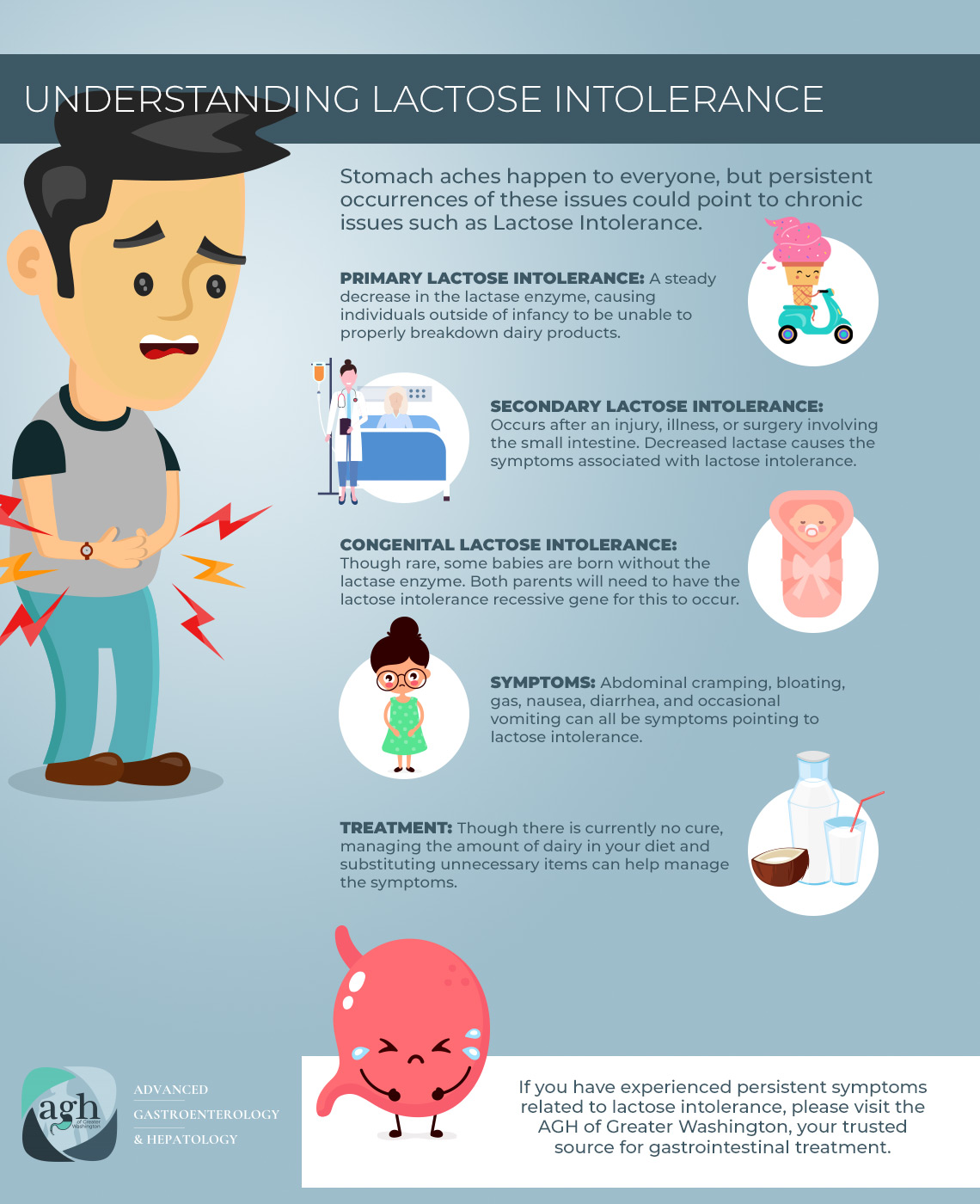Have you been feeling off after eating certain foods? Are common food items such as milk and cheese causing discomfort that is hard to discuss or reveal to others? If this has become a persistent issue, chances are that you could have a lactose intolerance issue. Read on to learn more about lactose intolerance and how it can affect you, and be sure to contact AGH of Greater Washington to gather expert advice on this inconvenient situation.

What is Lactose Intolerance?
Lactose Intolerance is a medical condition that resides in the small intestine of the human body. It is a condition in which the body cannot properly digest the sugars found in milk, known as lactose. Because of this, people with lactose intolerance will experience bloating, gas, and even diarrhea after consuming milk-based products. While this condition is typically harmless on an overall health and safety measurement, the symptoms associated with lactose intolerance can be very uncomfortable.
What Causes Lactose Intolerance?
Lactose intolerance is caused by the small intestine not being able to produce lactase, the digestive enzyme that can properly breakdown the sugars produced by milk. While many people have low levels of lactase in their bodies, they are still able to process dairy products properly. Therefore, true lactose intolerance is established when the symptoms are apparent after the consumption of dairy foods.
Within the spectrum of lactose intolerance, there are three different factors that lead to the deficiency of proper digestive enzymes.
Primary Lactose Intolerance
Primary lactose intolerance is the most common type of deficiency. During infancy, lactase levels are normal, as it is a necessity for infants to gain all of their nutrition. As the individual begins to replace milk with other food, the levels of lactase begin to decrease at a steady rate, but they are still able to digest the lactose with the remainder of their enzymes.
By the time they reach adulthood, however, the levels of lactase steeply decline, making it difficult to process the food by the time they reach adulthood. Primary lactose intolerance is genetically determined, though it isn’t typically diagnosed until the symptoms become regularly apparent.
Secondary Lactose Intolerance
Secondary lactose intolerance forms when the small intestine decreases lactase production after an injury, illness, or surgery that involves the small intestine. These illnesses and outside activity include celiac disease, bacterial overgrowth, or Crohn’s disease. With the treatment of these underlying conditions, the status of lactose intolerance may improve, though it could be a long road to recovery before dairy consumption does not continue to evoke symptoms.
Congenital or Developmental Lactose Intolerance
Though rare, it is possible for babies to be born with lactose intolerance due to a complete lack of lactase production. This disorder is rare because it is an inheritance pattern known as an autosomal recessive gene, meaning that both the mother and father have to pass on a lactose intolerant gene for the baby to be born completely lactose intolerant. Some premature infants may also be born lactose intolerant because of the failure to fully develop their lactase levels.
What are the Symptoms of Lactose Intolerance?
Signs and symptoms of lactose intolerance are generally not immediate, but rather take place during the digestion process, typically 30 minutes to two hours after consumption of food or drinks containing lactose. Common symptoms experienced by people with lactose intolerance include the following:
- Abdominal Cramping
- Bloating
- Gas
- Nausea
- Diarrhea
- Occasional Vomiting
Risk Factors Associated with Lactose Intolerance
There are factors to consider that could cause you or a loved one to be more prone to lactose intolerance, including:
- Ethnicity
-
-
- Lactose intolerance is more common in people of African, American Indian, Asian, and Hispanic descent.
-
- Premature Birth
-
-
- Lactase-producing cells develop in the third trimester, so premature babies may not have the time to properly develop them, leading to potential lactose intolerance either now or in the future.
-
- Increasing Age
-
-
- Lactose intolerance normally develops in adulthood rather than in babies and children.
-
- Diseases in the Small Intestine
-
-
- Small intestinal problems and diseases can create lactose intolerance patterns.
-
- Cancer Treatments
-
- Radiation treatment in the abdomen can increase the risk of lactose intolerance.
Treatment of Lactose Intolerance
Currently, there is no cure for lactose intolerance (boost of lactase production in the body), but you can typically avoid the discomfort of the symptoms in several ways.
- Avoid large servings of dairy during meals.
- Include small servings of dairy in regular meals.
- Consuming lactose-reduced food products.
- Consuming lactose-substitute products (i.e., Lactaid).
Gastroenterology with AGH of Greater Washington
While lactose intolerance can be an inconvenient and annoying hassle, you do not have to be alone in the process. Whether it is newly acquired or has been a persistent issue, AGH of Greater Washington has been delivering specialized intestinal services for years, and we pride ourselves on staying committed to all of our patients. If you are concerned about your symptoms, or just want to clear your mind of any worries, please do not hesitate to contact us. We hope to assist you soon!
Have questions? Fill out the form below!
The information AGH supplies on this website should not be used as a substitute to your regular physician’s medical advice. Your research from this website should not be used as a medical diagnosis. Consult your regular physician for diagnoses and treatments. The information found on this website is for educational purposes only. A formal consultation with a surgeon or doctor is needed before pursuing surgical procedures or medical treatments. Individual results may vary.
Gastroenterology Articles
Why is Early Detection So Important?
At Advanced Gastroenterology & Hepatology of Greater Washington, we’re dedicated to changing lives through innovative healthcare solutions. With liver disease affecting one in three Americans and often progressing silently, the importance of early detection cannot be overstated. Our state-of-the-art FibroScan test offers a glimpse into the future of liver health, where invasive procedures are no…
Read MoreWhat’s New at AGH of Greater Washington
At Advanced Gastroenterology & Hepatology of Greater Washington (AGH), we’re dedicated to pioneering health solutions that make a difference in our patients’ lives. With our latest offerings, including Semaglutide and Tirzepatide injections for weight loss, along with advanced FibroScan testing for liver health, we’re setting new standards for medical care in Virginia and Washington D.C.…
Read MoreWhat is FibroScan?
At AGH of Greater Washington, we’re at the forefront of innovative health solutions, consistently integrating advanced diagnostic tools to enhance patient care. A critical component of our services focuses on liver health — a vital aspect often overshadowed until significant symptoms emerge. Enter FibroScan, a groundbreaking liver scan technology that has transformed the landscape of…
Read More
